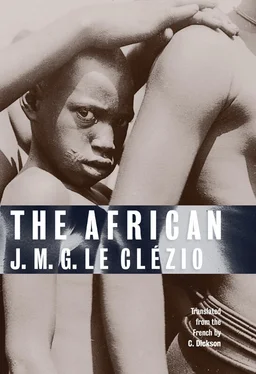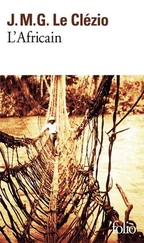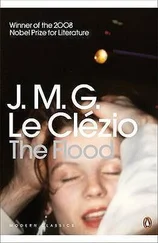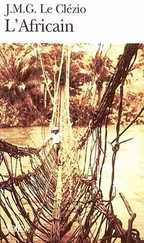That was the image my father hated. He who had broken away from Mauritius and its colonial past, who made fun of plantation owners and their grand airs, who had fled the conformism of British society where a man’s worth was measured by his calling card alone, he who had traveled the wild rivers of Guiana, who had bandaged, stitched-up, nursed the diamond hunters, the undernourished Indians, that man could only loathe the colonial world and its brazen injustice, its cocktail parties and neatly attired golfers, its servants, its fifteen-year-old ebony mistress-prostitutes brought in through the backdoor and its official wives puffing in the heat and taking their resentment out on their servants over a pair of gloves, some dusty furniture, or broken china.
Had he spoken of it? Where does that sensation of deep-rooted repulsion I have felt for the colonial system since my childhood stem from? I must have picked up a word, a thought about the ridiculous behavior of administrators such as the district officer of Abakaliki whom my father sometimes took me to see and who lived amongst his pack of Pekingese dogs that were fed filet of beef and biscuits, and given exclusively mineral water to drink. Or else the tales of Great White Hunters traveling in convoys on lion and elephant hunts, sporting rifles with telescopic sights and exploding bullets who, when they encountered my father in those remote lands, took him for a safari organizer and questioned him regarding the presence of wild animals. My father would answer, “In the twenty years I’ve been living here, I’ve never seen one, unless you’re talking about snakes and vultures.” Or still yet, the district officer posted at Obudu, on the Cameroon border, who got a kick out of having me touch the skulls of the gorillas he’d killed and showing me the hills in back of his house claiming that in the evening you could hear the thumping noises the apes made beating upon their chests to provoke him. And above all, the haunting image that still remains with me, the column of black prisoners in chains, walking in time along the road that led to the Abakaliki swimming pool, flanked by policemen armed with rifles.
Perhaps it was the way my mother saw this continent, with eyes that were so very pure, yet at the same time tarnished by the modern world. I can’t recall what she said to my brother and me, when she spoke of the country where she’d lived with my father, the place we would join him in one day. I only know that when my mother decided to marry my father and to go and live in Cameroon, her Parisian friends had said to her, “What, with the savages?” and she, after everything my father had told her, simply responded, “They’re no more savage than the people in Paris!”
* * *
After Lagos, Owerri, Abo, not far from the Niger River. My father was already far from the “civilized” zone. He contemplated equatorial African landscapes such as André Gide describes in his Travels in the Congo (more or less contemporary to my father’s arrival in Nigeria): the expanse of the river — vast as an arm of the sea — where pirogues and paddle-wheel boats navigated and its affluents — the Ahoada River with its “sampans” equipped with palm leaf roofs, propelled with poles, and nearer to the coast, the Calabar River and the indentation of the village of Obukun, hacked out of the dense forest with the aid of machetes. Those were the first sights that met my father’s eyes in the country where he was to pass the greater part of his professional life, the country that — out of necessity — he would be forced to adopt as his true country.
I can imagine how exalted he felt upon arriving in Victoria after the twenty-day journey. In the collection of snapshots taken by my father in Africa, there is one that particularly moves me because it is the only one he chose to have blown up and framed. It conveys the way he felt at the time, the impression of being at the beginning, on the threshold of Africa, in almost virgin territory. It shows the mouth of the river, in the place where the fresh water mixes with the sea. Victoria Bay follows a curve that ends in a finger of land where the palm trees are bent over from the sea breeze. The waves break on the black rocks and come rippling up to die on the beach. The sea spray, swept aloft on the wind, veils the trees of the forest, mingles with the mists rising from the river and the marshes. There is something mysterious and wild about it, despite the beach and the palm trees. In the foreground, very near the river bank, is the white cabin my father was lodged in when he arrived. It’s no coincidence that to designate those houses that Africans reserved for travelers, my father used the very Mauritian term “camp.” If that landscape lends itself to the term, if it also makes my heart race, it’s because it could be in Mauritius, at Tamarin Bay, for example, or else at Cap Malheureux where my father used to go on excursions when he was a child. Perhaps he’d thought, upon his arrival, that he would find part of his lost innocence, the memories that circumstances had torn from his heart? How could it not have crossed his mind? It was the same red earth, the same sky, the same incessant wind from the sea, and everywhere, on the roads, in the villages, the same faces, the same children’s laughter, the same carefree equanimity. The original land in a way, where time had gone backwards, had unraveled the threads of mistakes and betrayals.
* * *
That’s why I can feel his impatience, the pressing desire to go into the backcountry to begin his work as a doctor. From Victoria, the trails led him across Mount Cameroon toward the high plateaus where he was to take up his post in Bamenda. It was there that he was to work for the first years, in a half-tumbled-down hospital, a dispensary founded by Irish nuns, dried mud walls and a roof of palm leaves. There that he was to pass the happiest years of his life.
His house was Forestry House, a real two-story wooden house, with a roof of leaves that my father would take the utmost care in rebuilding. Below, down in the valley, not far from the prisons, was the Haussa town with pisé ramparts and high gates, exactly as it was during the glorious era of the Adamawa. A little off to one side, the other African town, the market, the palace of the King of Bamenda, and the guest house for the district officer and other officers of Her Majesty’s (they came only once, to decorate the King). A picture taken by my father, undoubtedly somewhat satirical, shows these officials of the British government, standing stiffly in their starched shorts and shirts, wearing helmets, calves sheathed in their woolen stockings, watching the parade of the King’s warriors, in loincloths, heads decorated with fur and feathers, brandishing their assegais .
My father brought my mother to Bamenda after their marriage and Forestry House was their first home. They filled it with their furniture, the only furniture they ever bought, which they took with them everywhere: tables, armchairs carved out of trunks of iroko, decorated with the traditional sculpture of the high plateaus of western Cameroon, leopards, monkeys, antelopes. My father took a picture of their living room in Forestry House, decorated in a very pronounced “colonial” style: above the fireplace mantle (it gets cold in Bamenda in winter) hangs a large shield made of hippopotamus skin, along with two crossed spears. They are probably objects left behind by the preceding occupant of the house, for it doesn’t look like the kind of thing my father would go out in search of. The carved furniture, on the other hand, came back to France with him. I spent a large part of my childhood and my adolescence surrounded by that furniture, sitting on the stools to read dictionaries. I played with the ebony statues, the bronze hand bells, I used the cowrie shells as jacks. To me, those things, the sculpted wood and the masks hanging on the walls weren’t in the least exotic. They were my African side, they were a prolongation of my life, and in a certain way, an explanation of it. And before my life, they spoke of the time when my father and mother had lived over there, in that other world where they had been happy. How can I explain it? I felt surprised, and even indignant, when I found out, long afterward, that objects of that sort could be bought and exhibited by people that had never known anything about all of that, for whom they meant nothing, and even worse, for whom those masks, those statues and those thrones weren’t living things, but dead skin that is often called “art”.
Читать дальше












